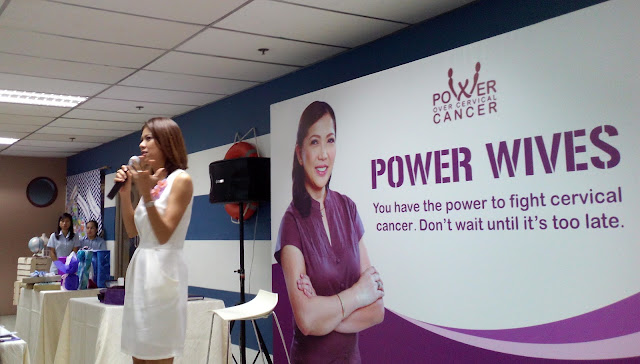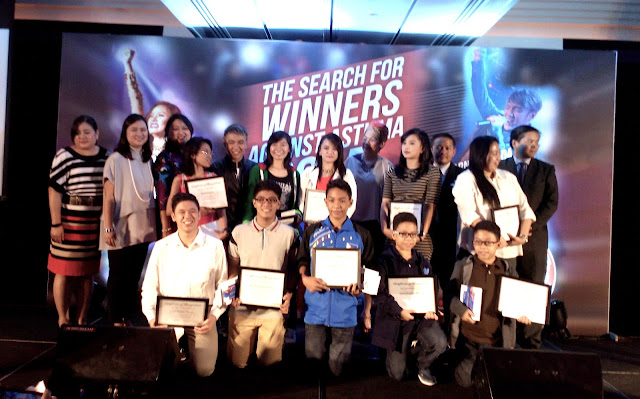Cervical cancer can often be found early, and sometimes even prevented entirely. If detected early, cervical cancer is one of the most successfully treatable cancers.
As we know, we may be living in an era where women not only rule our homes, they also run the world—from being leaders in the government to managing business enterprises, women now have more opportunities to realize their dreams.
The sad fact, however, is that every day, seven Filipino women die of cervical cancer, and may never get to complete their life goals, may be stripped of the chance to fulfill a successful career, start a family or even just find Mr. Right. All because of a disease, a kind of cancer that puts every woman at risk, regardless of race, age, lifestyle or socio-economic status.
Cervical cancer continues to be a major threat for Filipino women. It is the second leading cause of cancer deaths among Filipino women (Filipinas). What’s worrisome is that two in three Filipinas diagnosed with cervical cancer may die within five years. Since culturally, Filipinas are known to be caring and selfless for others but tend to dismiss concerns about themselves, those who may have contracted cervical cancer may have been diagnosed at a late stage, when the chances of recovery are slim.
What Is Cervical Cancer?
Cervical cancer occurs when abnormal cells develop and spread in the cervix, the entrance between the vagina and the uterus. This is caused by persistent infection with the cancer causing human papillomavirus (HPV)
It is also estimated that up to 80 percent of women will be infected with HPV at some point in their lives. Majority of HPV infections may come and go, some may clear spontaneously within two years, however if the immune system is weak, the HPV infections may persist and may eventually lead to the development of cervical cancer.
While HPV is primarily transmitted via sexual intercourse, skin-to-skin genital contact is also a recognized mode of transmission. Lifestyle changes can help prevent the development of cervical cancer, such as being conscientious about one’s sexual activities. Beyond regular consultations and pap smears by your OB-GYN, vaccines that protect against cancer-causing HPV are also now readily available.
Here are some facts I learned about Cancer :
- All women should begin cervical cancer screening at age 21.
- Women between the ages of 21 and 29 should have a Pap test every 3 years. They should not be tested for HPV unless it’s needed after an abnormal Pap test result.
- Women between the ages of 30 and 65 should have both a Pap test and an HPV test every 5 years. This is the preferred approach, but it’s also OK to have a Pap test alone every 3 years.
- Women over age 65 who have had regular screenings with normal results should not be screened for cervical cancer. Women who have been diagnosed with cervical cancer or pre-cancer should continue to be screened according to the recommendations of a doctor.
- Women who have had their uterus and cervix removed in a hysterectomy and have no history of cervical cancer or pre-cancer should not be screened.
- Women who have had the HPV vaccine should still follow the screening recommendations for their age group.
- Women who are at high risk for cervical cancer may need to be screened more often.
- Women at high risk might include those with HIV infection, organ transplant, or exposure to the drug DES. They should talk with a doctor or nurse about what screening plan is best for them.
Screening tests look for cancer before a person has any signs or symptoms. Regular screenings can catch some cancers early, when they’re small, have not spread, and are easier to treat. With cervical and colon cancers, these tests can even prevent cancer from developing in the first place.
Who is at risk?
The incidence of cancer-causing HPV infection is actually highest at the young ages of 15-19. One is at a greater risk of cervical cancer if one had her first sexual intercourse at a young age; have given birth for multiple times; have or have had sexually transmitted diseases; have HIV or whose immune system is weakened; a smoker; long-term use of oral contraceptives for 5 years or more and those who rarely or have not yet had any pap smear.
The World Health Organization Strategic Advisory Group of Experts (WHO-SAGE) on Immunization reiterates the importance of getting young girls protected through HPV immunization before their first exposure to HPV (i.e. before sexual contact), as young as 9 years old.
For older women, the risk of persistent infection with cancer-causing HPV (which is necessary for cervical cancer to develop) increases with age, and is highest when a woman is over 66 years old. Thus, screening is recommended starting age 21 to detect cervical abnormalities that precede actual cervical cancer. Studies further show that vaccination remains to be beneficial for older women to prevent HPV infections.
Power Over Cervical Cancer
In commemoration of Cervical Cancer Awareness Month, research-based pharmaceutical company GlaxoSmithKline (GSK) furthers its advocacy to increase cervical cancer awareness efforts with the Power Over Cervical Cancer “You Can & You Will” campaign.
The campaign aims to encourage Filipinas to realize that they have the power to protect themselves and their dreams—simply by consulting their doctors and asking about ways to prevent cervical cancer.
“An ounce of prevention is better than a pound of cure. Getting cancer may be a distant concept for women who are well and at their prime, but they should be aware that even the healthiest can be at risk,” says, Dr. Leah Manio, GSK Medical Affairs Manager.
"In the Philippines, it is estimated that the financial cost of preventing cervical cancer through screening and vaccination could be 20 times more affordable than the cost of treatment, ” she adds.
“The power to protect yourself from cervical cancer is in your hands, and NOW is the best time to consult with your physician and have yourself screened,” Dr. Manio stated.
GSK remains true to its commitment of increasing access to preventive healthcare through its initiatives to improve access to information through its disease awareness efforts.
To know more about cervical cancer, visit the Power Over Cervical Cancer Page on Facebook (
www.facebook.com/POCCPh) and the Pangarap Mo, Protektado page on Youtube (
www.youtube.com/ProteksyonPortal) containing information and short films conveying how protecting oneself against vaccine-preventable diseases is one important step in the achievement of one’s dreams.
You can make a difference in the fight against cancer by volunteering your time, to be aware and to share about he power over cervical cancer to our family, relatives, friends.
The Power Over Cervical Cancer is in your hands. The Power to Protect Yourself and Your Dreams,
You can and you will!
ABOUT GSK
GSK is one of the world’s leading, research-based pharmaceutical companies with the mission to improve the quality of human life by enabling people to do more, feel better and live longer. At the core of GSK’s business model is the use of knowledge and development of intellectual property. We create value by researching, manufacturing and making available products that improve people’s health and well-being. A healthier society enables people to live life to the fullest, allowing them and their communities to prosper. A sustained flow of innovative products enables our business to grow and replenish our value to patients and consumers.
GSK manufactures and distributes more than four billion packs of products to 150 countries around the world. With this extensive global presence, GSK is striving to make our products as widely accessible as possible.
To increase access to GSK products in the world’s least-developed countries, we have held prices of our patented medicines in this region at no more than 25% of our developed-world prices and we reinvest one-fifth of the profits we make from sales in these territories back into local healthcare infrastructure projects.
Our vaccines business is one of the largest in the world, developing, producing, and distributing over 1.9 million vaccines everyday to people across the world. In 2015, we distributed more than 600 million doses to over 150 countries. We believe that the protection from life-threatening diseases provides opportunities for improved healthcare, not just for individuals but for the communities in which they live.
Over the last forty years, the medicines, vaccines, and devices we have developed, together with insights from our scientific programs and our collaboration with healthcare professionals, have played a fundamental role in improving disease understanding and patient management.
For further information, please visit www.gsk.com.
































